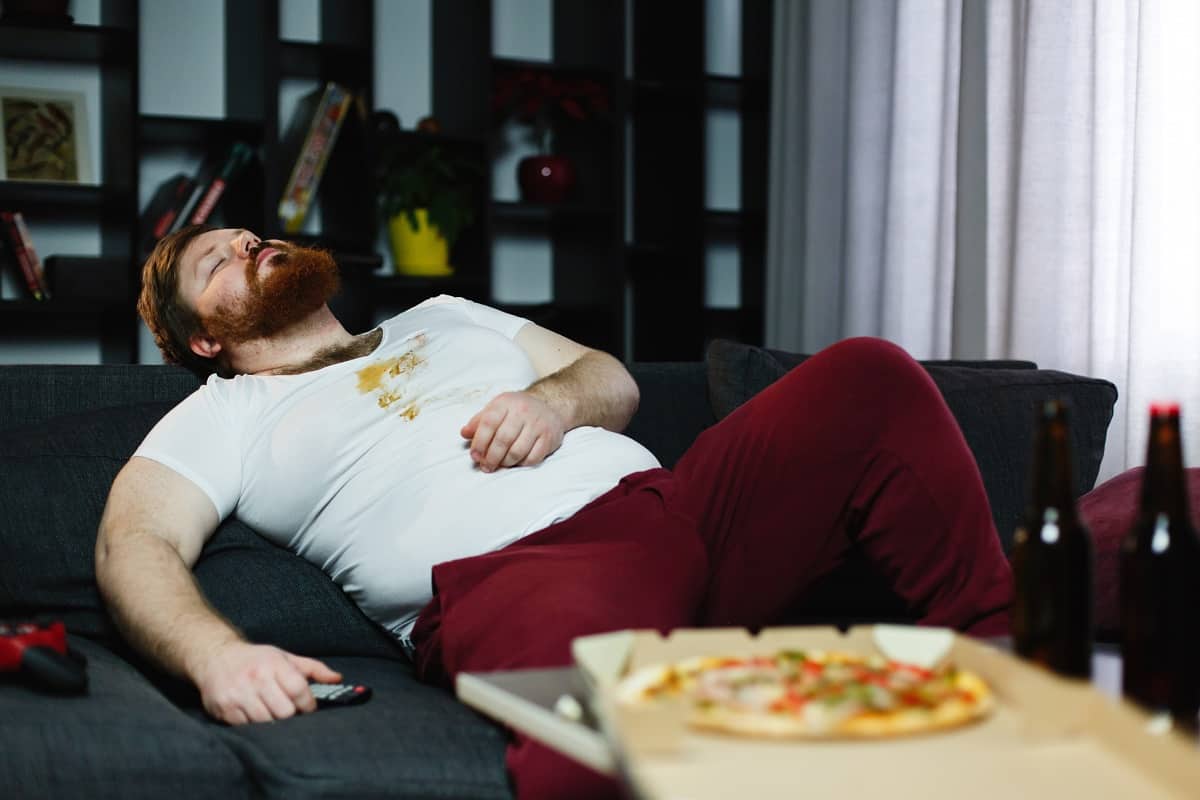Your body is designed to use food as fuel. But if you go overboard at the brunch buffet or push through and finish a whole pizza in one sitting, food has the opposite effect: it puts you to sleep.
Yeah, we’re talking about food comas.
If you tell someone you’ve fallen into a food coma, they might think it’s just an excuse to pass out on the couch after dinner instead of helping with the dishes. But it’s not just your imagination—food comas are a legit biological phenomenon.
In this article, we explore the science behind post-meal sleepiness, how to revive yourself, and whether food comas are preventable.
What Is a Food Coma?
“Food coma” is a slang term for experiencing drowsiness after you eat a big meal. The exact cause of food comas is unknown but may happen because of changes in blood circulation, hormones, and the type of food you eat (more on these theories later).
The scientific term for a food coma is “postprandial somnolence.” It’s also known as the post-dinner dip.
Studies have shown food comas to be a legitimate phenomenon. For example, a 2019 study of truck drivers found that eating heavy meals strongly correlated with feelings of sleepiness compared to drivers that ate lighter meals.
Unlike a regular coma where your brain literally stops working, food comas are generally harmless, although they probably indicate overeating. Common symptoms of a food coma include:
- Sleepiness
- Laziness
- Trouble focusing or concentrating
Anybody can experience a food coma. However, food comas tend to be more common among obese people than lean people, according to a 2018 study in Molecular Metabolism.
6 Potential Causes of Food Comas
Scientists haven’t determined exactly why food comas happen. That’s partly because there isn’t a ton of research around them, but also because people respond to food in different ways.
Your dad might need a nap after every meal while you can devour an entire Thanksgiving dinner without your energy levels being affected at all.
There are several theories behind food comas, some of which are more credible than others. Let’s take a look at five common ones, starting with the most obvious.
1. Eating Large Meals
Consuming a large amount of food taxes your digestive system. Your body expends a lot of energy breaking everything down and absorbing nutrients, which can wear you out.
Researchers found that fruit flies were more likely to sleep after a big meal compared to a small meal, especially if the meal contained a lot of protein.
Big meals also cause your blood sugar to spike. This might give you a short burst of energy, but then you’ll crash later.
2. The Type of Food You Eat
Food comas are mostly about how much you eat, but what you eat matters too.
- High-protein meals can make you tired since protein stays in your stomach longer.
- High-fat foods are a culprit for food comas since they take a long time to digest.
- Starchy carbs like white bread, mashed potatoes, and pasta cause your blood glucose levels to spike. The inevitable crash can put you in a food coma.
For context, macronutrients like protein, carbs, and fat themselves don’t cause food comas. It’s imbalances and high volumes that knock you out.
3. Hormones: Tryptophan and Serotonin Levels
Meal time can trigger certain hormones that induce food comas. Take tryptophan, for example. Tryptophan is an amino acid that produces serotonin: a hormone that makes you feel more relaxed and fall asleep.
A common myth is that turkey is super-high in tryptophan. However, turkey’s tryptophan content is similar to chicken, beef, and other types of meat.
It’s believed that consuming tryptophan with a high-carb meal can exaggerate its effects, but there isn’t sufficient evidence to prove that theory.
4. Blood Flow Changes
Eating activates your parasympathetic nervous system (PNS), which controls your blood pressure and digestive system. When food goes into your gastrointestinal tract, it increases blood flow to your stomach and intestines.
One theory is that this limits blood flow to your brain, inducing a food coma. However, most doctors agree that blood flow to the brain is regulated by the circulatory system and isn’t affected by eating.
5. Eating in the Middle of the Day
If you experience more food comas after lunch compared to dinner, it’s not your imagination.
Your circadian rhythm causes you to get sleepy in the late afternoon. Even if you don’t eat a heavy meal, your energy levels will probably dip between 1-3 p.m. However, if you combine your afternoon slump with the aftermath of a greasy burger, your coworkers will have to use a forklift to get you out of the office.
6. Drinking Alcohol with Food
If you pair a heavy meal with heavy drinking, you may be more susceptible to a food coma. Alcohol is a depressant, which means it makes you sleepy. Of course, if you enjoy a boozy meal and fall asleep afterward, the line between food coma and passing out gets blurred.
As you can see, there isn’t a clear-cut answer for what causes food comas. Some of the theories overlap and others contradict each other. The main point is that when you stuff yourself with protein, carbohydrates, and fast, you’re gonna feel sleepy afterward.
How Long Does a Food Coma Last?
You can expect the fatigue from a food coma to last between 2-4 hours. However, that estimate is based on anecdotal reports. There’s no concrete evidence for how long food comas last.
Falling into a food coma after a Thanksgiving feast is no big deal since you can just veg out on the couch and watch football. But if you gorge yourself on a weekday and have work to do, you’ll need to snap out of it.
How to Revive Yourself from a Food Coma
The process of getting out of a food coma is similar to combatting any other type of fatigue. The only difference is you have a full stomach, so you’ll probably feel even less motivated than usual.
Nevertheless, here are three tips to pull yourself out of a food coma.
1. Get Moving
Resist the urge to slump into the couch. Physical activity aids the digestive process and keeps you alert. You don’t have to run hill sprints after supper—a quick stroll will boost circulation and increase your energy levels.
2. Drink Some Coffee
Coffee can be a great solution to get you out of a slump. Just beware you might crash from your caffeine high (and it will probably make you poop).
3. Look at Blue Light
This is a weird one, but a 2015 study showed that exposure to blue light after lunch reduced fatigue and increased productivity. Blue light comes naturally from the sun, so spending time outside may do the trick.
How to Prevent a Food Coma
Here are a few tips to reduce your odds of falling into a food coma:
- Eat smaller meals: That’s easier said than done when you’re staring down a buffet, but slowing down and limiting your portion sizes will help you feel less sluggish, even if you don’t make the healthiest choices.
- Practice healthy eating: You probably won’t fall victim to a food coma eating veggies and lean protein.
- Get plenty of sleep: If you’re sleep-deprived going into a heavy meal, your chances of a food coma go up.
Get Ready for a Post-Coma Crap
There’s a lot of mystery surrounding food comas. But one thing is certain: you’re going to take a massive dump sooner or later. You don’t want to be sleepy and smelly, so make sure you’re stocked up on DUDE Wipes to clean up the aftermath down below.









Leave a comment
This site is protected by reCAPTCHA and the Google Privacy Policy and Terms of Service apply.